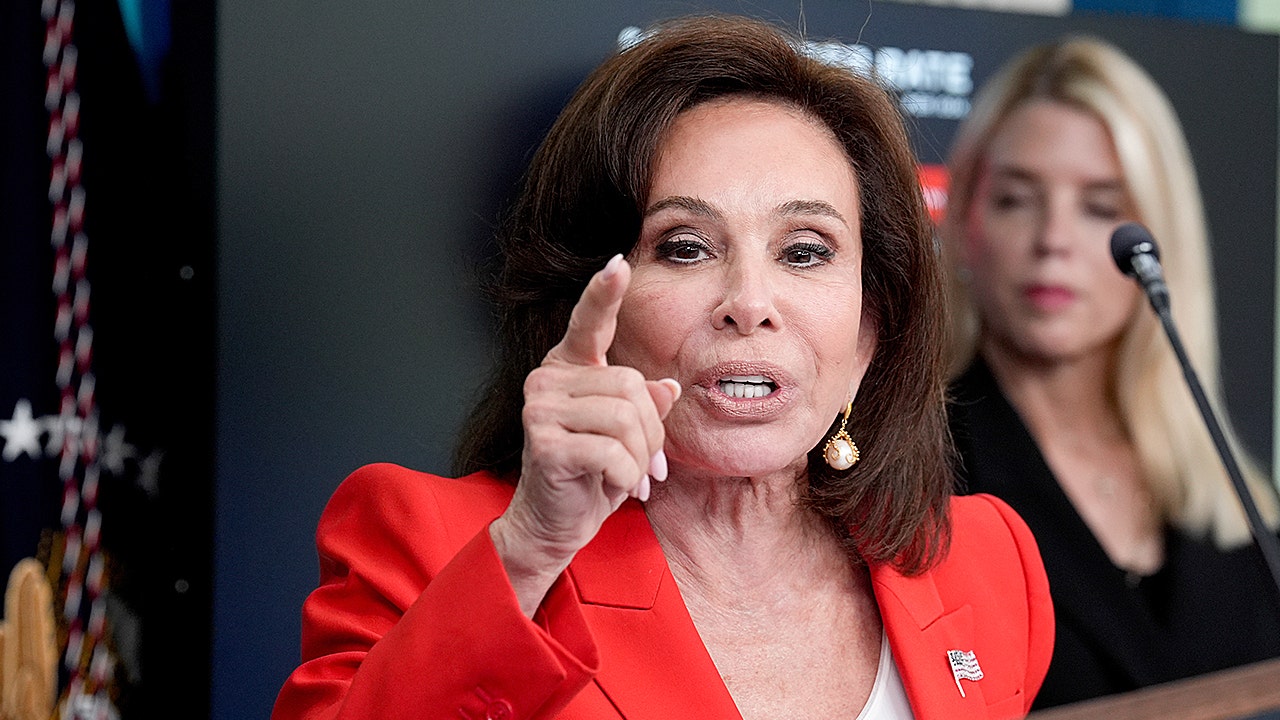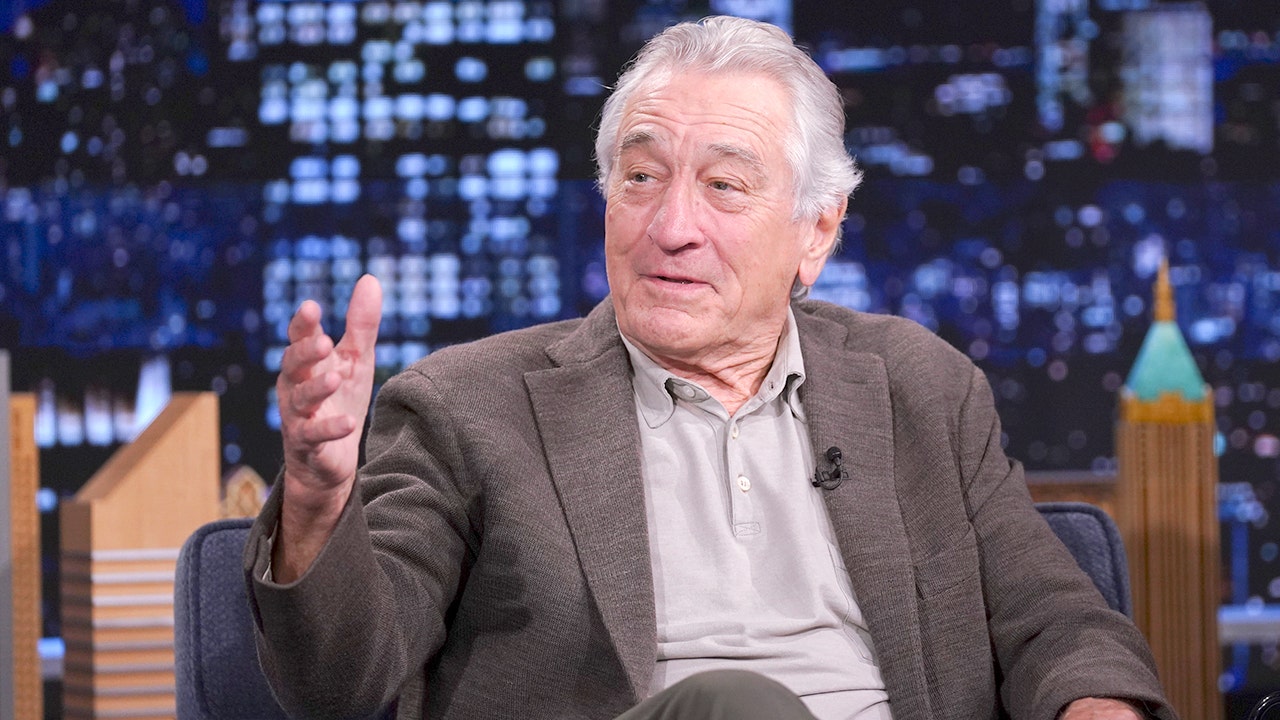It was supposed to be a moment of cinematic dominance — the kind of fiery political confrontation that Robert De Niro, a man of legendary screen presence and even stronger political convictions, has long relished. But what unfolded on live television this week became something entirely different: a public unraveling of control, composure, and credibility.
In a segment that was billed as a “conversation on truth, accountability, and the state of American discourse,” De Niro entered the studio determined to corner Fox News host Jeanine Pirro. What he didn’t anticipate was that his plan would implode before millions of viewers, as Pirro transformed from the supposed target of his critique into the sharpest voice in the room — a woman entirely unshaken by Hollywood’s moral theatrics.
What began as an attack ended as a reversal. What was meant to humiliate became, instead, a masterclass in defiance.

The Setup: De Niro’s Mission to Deliver a Message
For decades, Robert De Niro has cultivated a reputation as one of Hollywood’s fiercest critics of conservative politics. From his profanity-laden comments about Donald Trump to his repeated jabs at Fox News, De Niro has never shied away from political confrontation. His activism, in many ways, has become as defining as his artistry.
Producers of the live segment — aired on a prime-time current affairs show — reportedly invited De Niro to discuss “the intersection of politics and truth in the modern media.” Pirro, known for her confrontational interviewing style and her unfiltered opinions, was brought on as the counterbalance.
What no one expected was that De Niro would take the conversation in a radically personal direction.
According to insiders, De Niro had privately expressed his intent to “challenge” Pirro — to hold her accountable for what he viewed as “dangerous rhetoric” and “fear-based journalism.” One producer described his pre-show mood as “quietly agitated, almost rehearsing his lines.”
But the problem with rehearsed outrage is that it rarely survives contact with real-time pushback.
The Confrontation: When De Niro Crossed the Line
When the cameras began rolling, the atmosphere turned electric. De Niro wasted no time cutting through the small talk.
“You call yourself a judge,” he said sharply, “but what kind of justice is it when you spend every night sowing division and fear? Is that who you want to be — the voice of anger?”
It was a calculated strike — the kind of theatrical aggression that might have worked in a scripted setting. But Jeanine Pirro is no stranger to confrontation, and she’s built a career on dismantling it.

Pirro paused, smiled faintly, and leaned forward. Her reply was slow, deliberate, and devastating:
“Robert, I don’t play roles. You do. So maybe let’s start by separating Hollywood drama from reality. You’ve made a living pretending to fight corruption — I’ve spent my life actually doing it.”
The studio erupted. Even the hosts were caught off guard. De Niro blinked, momentarily speechless.
It was the pivot point — the exact second the “ambush” collapsed under its own arrogance.
The Turning Tide: Pirro Takes Control
What followed was not a shouting match, but a calculated dismantling. Pirro, ever the prosecutor, began to interrogate De Niro’s assumptions — his privilege, his detachment, his tendency to moralize from a distance.
“You talk about unity,” she said, “but what you mean is conformity. Anyone who disagrees with you gets labeled ignorant or evil. That’s not justice — that’s vanity disguised as virtue.”
It was as if Pirro had taken a script De Niro had memorized and rewritten it line by line. Her composure under fire — the tone, the rhythm, the rhetorical precision — left him visibly unsettled.
At one point, De Niro tried to interrupt, insisting that “truth should not be partisan.” Pirro didn’t raise her voice. Instead, she turned to him with the calmness of a judge rendering a verdict:
“Then perhaps you should start by admitting that truth isn’t owned by Hollywood.”
The studio fell silent.
The Fallout: When the Performer Lost the Stage
By the end of the segment, the shift was complete. De Niro, who had entered as the moral aggressor, left looking like a man who had lost control of his own scene. Pirro, on the other hand, emerged as the unlikely victor — not because she shouted louder, but because she understood something fundamental: emotional dominance does not equal intellectual clarity.

Within minutes, social media lit up with reactions. Hashtags like #DeNiroVsPirro, #PirroStrikesBack, and #HollywoodMeltdown began trending. Clips of the exchange racked up millions of views.
One viral post read:
“Jeanine Pirro just turned Robert De Niro’s ambush into a self-inflicted PR disaster. You can’t outact a woman who’s spent her career fighting real battles.”
Even among De Niro’s supporters, there was a sense of unease. What was supposed to be an impassioned critique of conservative media turned into an awkward display of condescension — a Hollywood legend lecturing a former judge, only to be dismantled by her poise.
Behind the Scenes: The Unraveling
According to a member of the production team, the exchange “went off-script within 90 seconds.” The producers had expected tension, perhaps even a headline or two — but not a total narrative collapse.
“When Pirro started taking control,” the insider said, “you could feel it in the control room. Everyone went silent. De Niro wasn’t supposed to be on the defensive. But she had him cornered.”
After the cameras cut to commercial, witnesses described De Niro as visibly frustrated. He reportedly muttered something under his breath — “This wasn’t supposed to go like this” — before walking off set. Pirro, by contrast, stayed seated, chatting with the crew, calm and collected.
The difference in demeanor said it all.
Symbolism: A Battle Bigger Than Two People
This wasn’t merely a television skirmish between two public figures. It was a snapshot of America’s ongoing cultural war — the tension between elite liberal Hollywood and grassroots conservative populism.
De Niro represents an era of celebrity activism that believes moral authority can be projected through art, wealth, and fame. Pirro represents a different current — populist, defiant, suspicious of establishment narratives, and unwilling to yield to celebrity scolding.
The clash between them was not just about politics; it was about who gets to define truth in the modern age.
In many ways, the segment embodied the state of public discourse: emotional, polarized, yet deeply revealing. De Niro, the artist, believed he could dictate truth through passion. Pirro, the litigator, demonstrated that truth must be tested, not declared.
And in that contrast lay the lesson — that conviction without discipline collapses under its own emotion.
Reactions from Both Camps
Hours later, Pirro’s social media accounts posted a short but sharp message:
“Some people rehearse their arguments. Others live them.”

De Niro’s representatives declined to comment, releasing only a vague statement about “standing up for decency.” But even sympathetic outlets acknowledged that the actor had “overplayed his hand.”
Critics on both sides weighed in. Variety described the encounter as “a live implosion of moral grandstanding.” The New York Post called it “Pirro’s best unscripted performance in years.” Even centrist commentators noted that Pirro had “exposed the emotional fragility of Hollywood outrage.”
The Broader Lesson: When Authenticity Wins Over Performance
The incident underscores a truth that transcends politics: authenticity beats performance every time. De Niro came prepared with lines; Pirro came armed with conviction.
In a society increasingly defined by televised debate and curated outrage, moments like this pierce through the noise. They reveal who is performing and who is simply speaking.
De Niro, for all his brilliance as an actor, seemed unable to step out of his cinematic instincts — as if he were still in a role, still expecting applause. Pirro, meanwhile, played no role at all. She didn’t need one.
Conclusion: The Night the Script Flipped
When the credits rolled, the verdict was clear — at least in the court of public perception. Robert De Niro’s attempt to confront Jeanine Pirro had backfired spectacularly. His carefully constructed moral stance collapsed under the weight of Pirro’s raw authenticity and rhetorical precision.
For De Niro, it was a humbling reminder that political conviction, when delivered without humility, can look like arrogance. For Pirro, it was a validation of her entire persona — unflinching, fearless, unapologetically combative.
In the end, the night wasn’t about who shouted louder, or who looked better on camera. It was about who controlled the narrative — and Jeanine Pirro did.
Because when the lights dimmed and the studio fell silent, one truth remained:
Hollywood may know how to write a script — but Jeanine Pirro knows how to rewrite it.